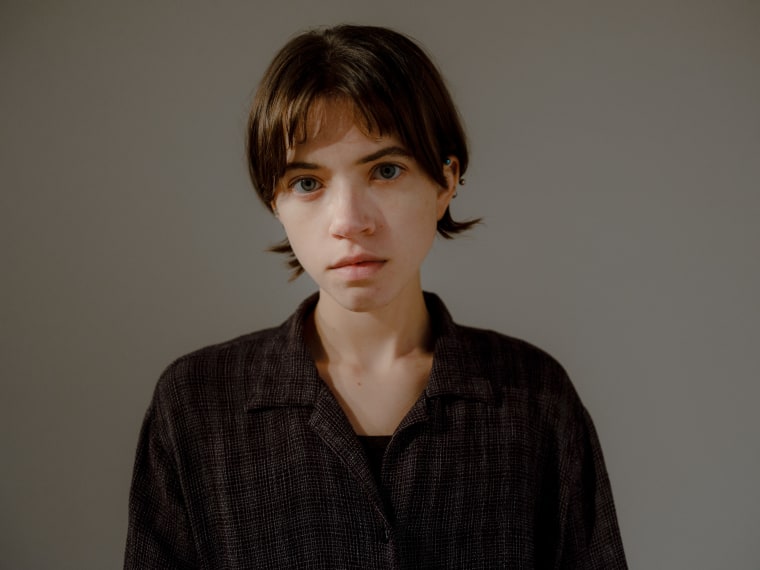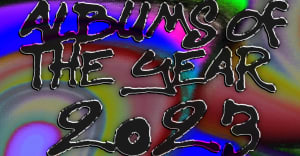 Maria BC. Photo by Ulysses Ortega
Maria BC. Photo by Ulysses Ortega
Maria BC's 2021 EP Devil's Rain introduced the Ohio-born, Oakland-based artist as a folk songwriter with the soul of an ambient music composer. Its five tracks have a special abundance despite the sparseness of elements; BC wields guitar reverbed through a tide pool, electronics that blister and balm, and a voice coursing with resolve beneath its classical, mellifluous beauty. Hyaline, Maria BC's debut album, is out on May 27, and today we're premiering its final single "Betelgeuse."
The new song is named after a dying star, Maria explains in a press release. An astronomer told Maria when they were in eighth grade that it was the only star that might it explode in their lifetime; near the end of 2020 it looked like it might go supernova, but it remained a pinhole in the night sky. "The title 'Betelgeuse' has something to do with how grief can bring on this desire for a meteorological or astronomical alignment with your experience," they write. "But no, the world doesn't stop. It makes you want to throw a wrench in the gears, blow something up, get people to notice.”
"Betelgeuse" doesn't keep our attention by wallowing in despair or unleashing a flood of self-pity. BC's presence and composition grazes against an eldritch wisdom, their loose, gothic balladry sounding like a harbinger's urgent dispatch. Listen to "Betelgeuse" below, followed by our Q&A with Maria BC.
The themes of the song revolve around suffering: our experience of it and its relative unimportance on a cosmic scale, as well as how easy it is to inflict despite our awareness of the consequences. How does your nuanced approach to suffering in your creative work affect your experience of it in your day-to-day life?
We all hurt each other and get hurt, but we’re raised to believe that people who do bad things are essentially bad and that the world is made up of individual victims and villains. This inheritance is a huge psychic burden. It leads us to thinking of ourselves as wasted matter. In my life and in my art, I want to practice generosity. Broadening my scope, fleshing out context, allowing for nuance, whatever you want to call it, I just feel better when I choose to see people as more than victims and villains, so I try to write lyrics that speak to more than pure resentment or pure regret. If any of my songs can be summed up with a single statement - especially one like “You’ve wronged me” - then I’ve failed.
A lot of your music has the texture of memory, but it's present in the feeling of it rather than being nostalgic. In writing your new album, were you reckoning at all with your past, whether it was your childhood in Ohio or adulthood in Brooklyn and Oakland?
Definitely. I’m not a nostalgic person, but I’m fascinated by how memory invades the present moment. We all have trauma - since without trauma, there’s no self, just, like, a blob with no coping skills - so we’re all looking at the world and seeing different things, these separate worlds colored by our respective past experiences. This is an inescapable fate, and a very painful one. I think about it too much, maybe. A lot of my music deals with feeling haunted by memory, as well as wanting to open up to new experiences and new memories that could reshape the lens through which I see the world.
Your vocal performances have a rare quality that makes it feel like you're singing because you have to reach something rather than just create a piece of art. What's your first memory of singing that you cherish?
Wow, thank you. I like that sentiment. My first memory of singing, I think, I was performing this song I’d written for my mom. I was pretty young, like six or seven maybe? I presented it to her as a birthday gift, but I got really nervous and kept switching keys and totally bombed it. But she cried and hugged me anyway.

